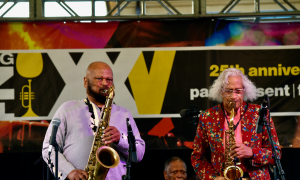Home » Jazz Articles » SoCal Jazz » Catalina Jazz Club: Landmark Jazz Haven Forges Onward
Catalina Jazz Club: Landmark Jazz Haven Forges Onward

Being from Romania, I knew nothing about jazz. I mean zero, zilch, nada. All of a sudden I found myself in the middle of the ocean. Little by little I learned how to swim. Then I learned how to swim well.
—Catalina Popescu
AUTHOR'S NOTE: This is not a time to beat around the bush. The beat of this historic and most significant jazz club has been forced to take far too long of a break between sets. If you appreciate that very tangible presence and energy of live music, then you are a proud member of the jazz community. Please see below, within the body of this conversation, or further below in a personalized video, what our proactive community can do to breathe life and sustain that ever vibrant flow through our veins.
All About Jazz: Hi Catalina, how are you?
Catalina Popescu: Hi Jim. I'm okay. How about you?
AAJ: I'm good and you know I just saw your post on Instagram that goes back to the beginning, referencing the 1986 Dizzy Gillespie performance and the fact that the lines were around the block. Your longtime general manager, Manny Santiago, laughingly recalling, "What the hell did I get myself into?!"
CP: (laughing) Yes, it's true. Manny has been here from the beginning. I don't know where I would be without him.
AAJ: I know that you and your late husband, Bob, decided to open a restaurant in 1986. There was no thought of a jazz club at that point. Perhaps you can take the story and run with it from there.
CP: I had a lot of experience working in restaurants. I used to run the restaurant inside the famous Bullocks Wilshire. On the fifth floor they used to have a tearoom. I ran that tearoom for ten years. My husband and I decided to have our own restaurant. We found a location on Cahuenga Boulevard that was our original location. Of course, things did not go the way that we planned. It was not that easy. We had some friends that thought some light music would be a great addition. Then Buddy Collette, who was a very good friend, suggested that jazz would go better with food and wine. He offered us some guidance. My husband was a general contractor, so when Buddy asked him how long it would take him to have a stage, he said, "I'll have it in a week."
AAJ: No messin' around!
CP: No messin' around at all. Of course, the first performer was Buddy Collette and his band.
AAJ: That makes sense.
CP: Yes, and that was in October of 1986.
AAJ: Soon thereafter, your husband, Bob, decided to go big or go home.
CP: He was always the one with a great view in life. He always saw the big picture. We had a couple of months of jazz, and things were not that great. He decided that this was not the way to do it. That for us to survive, and make this place happen and succeed, we need to bring in great musicians. We need to pay them a great deal of money and that was the way to do it. At that time, we knew nothing about jazz. We had come from Romania, where they didn't allow anything from the outside. Dizzy Gillespie, however, visited our country during communist times. So, we knew of him. My husband said, "I think Dizzy Gillespie might do." He picked up the phone and was calling around and no one would talk to him or hear anything that we had to say. Buddy Colette gave my husband Dizzy Gillespie's phone number. So, he called Dizzy directly. Dizzy was very gracious, and he said, "Yes I will come." So, we decided on a date, that we didn't realize at the time was Easter weekend. The show was on Friday. We were concerned that it might not be the best for business. But once word got around the lines were indeed around the block.
AAJ: Man, that's the way to do it.
CP: (laughing) Yes, the recipe was that we need to pay for great music, with the greatest musicians, and people will come to our door.
AAJ: And that's exactly what happened.
CP: Yes, the only thing that is different thirty-four years later is that my husband is no longer with us.
AAJ: I am so sorry that is the case.
CP: I miss him terribly because he was always there in the club. He had his desk, I had my desk, Manny had his desk, and my mom had her desk. Our whole family was there. Now it's only myself and Manny.
AAJ: How many years ago did your husband pass away?
CP: He passed away in 2008. So, it has been twelve years. I had a lot of people coming to me, like sharks that smelled the blood, that supposedly wanted to help me. I realized that I had Manny and that we didn't need anyone else.
AAJ: Well, it obviously just increased the number of things that you and Manny needed to do.
CP: Absolutely. But it is a much better feeling when we talk directly with the musicians or to their publicists. It's a wonderful feeling when the musicians get to the club and we talk with them. We appreciate them, we pay them, and the whole enchilada.
AAJ: That family you mentioned extends to all the musicians as well.
CP: Yes, absolutely. I am so grateful to have met the greatest of the greatest that this music has presented ever. All these legends that have been here. All these legends that became our friends and our family. Going back to Dizzy Gillespie and Easter weekend, my husband was concerned that Dizzy and his band would not be with their families, being traveling musicians and all. So, he went out and bought a whole lamb and brought it to the club. On Easter, all my employees and Dizzy and his bandmates all sat down together, and we had a great Easter lunch.
AAJ: Wow, how wonderful. What a considerate and generous thing to do. Thank you for sharing that story.
CP: Yes, and this is one of the many many thousands of memories we have.
AAJ: Perhaps you could share another.
CP: One night, on the same stage, playing the same tune, there was Dizzy, Miles Davis, Freddie Hubbard, Harry "Sweets" Edison, Carmen McRae, and a couple of others. That never ever happened again ever before or after.
AAJ: That's amazing. I'm just speechless at that.
CP: I didn't realize then, that I should have been taking pictures. But I wasn't there to take pictures, I was there to take care of my business.
AAJ: You were caught up in the moment and how wonderful it was.
CP: Exactly. Exactly right. It was so memorable and so wonderful.
AAJ: What other artists, particularly in those early years at the club, do you remember quite fondly?
CP: Oh, there are so many. Art Blakey, Milt Jackson, Elvin Jones, Horace Silver, and Chick Corea, just to name a few. So so many. I love McCoy Tyner. One that I love so much as a man and as a musician is Ray Brown. He was the greatest gentleman and most wonderful soul that ever existed. To give you an example, he was performing at the club at least two times a year. We of course had a fee set in advance. But you know sometimes it's a really great night and maybe sometimes not as much. When business was not so great, he would come to me and only want what was fair. Tell me, how is that? For somebody to tell me, "Don't pay me more money than what you took in. It's alright, I'm fine with that."
AAJ: That's a fine and honorable man to do that. I imagine some would be far less flexible.
CP: Oh my God. I don't want to mention those. Another that has been the best of what this club has ever been is Steve Tyrell. He did his first show of his lifetime at my club. Ever since, every Valentine's Day is spent with him. No discussion. Everybody knows that for Valentine's Day we have Steve Tyrell performing. Over the years we have become good friends and he was good friends with my husband. When my husband passed away it was very sad. It was very sudden. No one expected it. It was, of course, a very difficult time for me. When we had the funeral, here comes Steve Tyrell and he gave me a big hug. Then I found out that he was performing that weekend in Florida. He took a plane from Florida to come to L.A. and come to the funeral. Then flew back to Florida to do his show. How much more of a great human and friend than that can you find?
AAJ: That's a wonderful story about an obviously genuine human being. That's impressive.
CP: What's impressive is that there are such great human beings, and I have been fortunate to know so many.
AAJ: Yes, I have found that the vast majority of jazz musicians that I know, or have at least spoken with, are very genuine heartfelt people. They got the moniker of cool cats for a reason.
CP: Yes, and it is also about the real music. These days they call it music, but it's not music anymore.
AAJ: Amen to that.
CP: Once you have been touched by the great jazz music of these legendary musicians and once your soul has been dedicated to that music, I don't think you can be a real asshole. You cannot be that anymore.
AAJ: That's a good perception. The music represents a certain depth. The people that are playing it, and those people that are really hearing it, are more likely on the same plane. There's a richness of commonality there.
CP: Absolutely there is.
AAJ: You were talking about annual events, such as Steve Tyrell at Valentine's Day every year. That's something I have always appreciated. That you can mark your calendar for a particular artist to be there. My wife and I have been there every December for Mike Stern since the beginning of time. Talk about your genuine cool cat.
CP: Oh, my Lord. I love Mike. He is so wonderful. I have known Mike for many years, and he has been nothing but such a kind soul and kind-hearted man. He is so nice to my staff. They all love him. When Mike comes it's a big party, because he is so full of joy.
AAJ: He always has the big genuine smile on his face, doesn't he?
CP: Exactly. Another thing is that he is always talking about his life and the mistakes he made. He is always saying to people not to do that. He has told me that he is very grateful to be alive.
AAJ: Yes, Mike and I have had similar conversations. He isn't afraid to bare his soul for the greater good. An admirable trait to be sure.
CP: That's for sure. He is such a wonderful man.
AAJ: You mentioned not knowing anything about jazz at the beginning, but Jimmy Haslip tells me that you are quite the jazz afficionado these days.
CP: I have to tell you that I knew nothing about jazz. I mean zero, zilch, nada. All of a sudden, I found myself in the middle of the ocean. Little by little I learned how to swim. Then I learned how to swim well. I got to be in contact with the musicians. I was able to talk to them, and foremost, to listen to their music. There is nothing like live music. Nothing will ever replace live music.
AAJ: I would have to agree with you on that. I surely miss it.
CP: To be so close to the band that you can feel their sweat on you, there is nothing else like that.
AAJ: Okay you have me missing it even more now. You moved from that Cahuenga location to where you are now on Sunset Boulevard in 2003. Was that just about needing more space or were there other contributing factors to that move?
CP: We definitely needed to have more space. But the situation was that all of a sudden everybody was looking at Hollywood like it was going to be a pot of gold. This included our landlord on Cahuenga. When our lease was up, she went three times higher on the amount that we had to pay on the lease. So, for the last three years of that lease my husband was looking and looking for a great place for us to move. We wanted to be located on one of the major streets and to have plenty of parking. We had very little parking at the first location. We wanted to be able to keep our telephone number. It took three years and he found it. We moved from the old spot to the new spot on the last week of the lease.
AAJ: The landlord actually tripled your rent every month? That's outrageous.
CP: Yes, she tripled it.
AAJ: Basically, they were forcing you out.
CP: Yes, absolutely. It made no sense for us to pay that kind of money.
AAJ: One thing you have done is to create a listening room atmosphere. People are truly listening to the music at the Catalina. You can't say that about many other clubs that are chatty. How did you foster that environment?
CP: We imposed respect toward the music and the musicians. When we had a situation where people were speaking out loud, we would kindly go to them and ask them to lower their voices. On occasion I have to throw people out, and I do. The word got around. You go to the Catalina a little earlier and have your dinner. Plenty of time to be talking to your friends. When the music starts, that's why you are here. That's what you pay a cover for. So, you listen.
AAJ: When you put it that way, it just seems like common sense. It has always seemed that way to me. I will never understand why people will pay a cover to not listen to the music. Especially, as you say, when they have an opportunity to talk about current events during their dinner.
CP: Exactly. Why would you not want to listen? When you come to the club it is not like we are imposing something you are not aware of. You know when you're coming that you are so excited to hear a particular musician. That's great. You paid, you had dinner and some conversation. Now the music starts, and that is the reason you are there. Time to enjoy it.
AAJ: There are other supper clubs in LA, who will remain nameless at this time, where the chatter is nonstop. It drives me nuts.
CP: We have a limited tolerance for that. I personally take it very seriously. That is why we have been here for thirty-four years. Every place you go has their rules. You play by the rules, or there is the door.
AAJ: Yeah, it makes no sense to be talking, but then again, there are a lot of things in this world that don't make sense.
CP: Oh please, don't get me started on that.
AAJ: (laughing)
CP: That is way too big a subject to talk about.
AAJ: (still laughing) Yes, it is.
CP: (laughing) Let's stick to jazz.
AAJ: Let's do that. Perhaps you could share another memory.
CP: Ahmad Jamal is a very dear friend of mine. He wrote a piece for me that is a tune called "Catalina."
AAJ: Oh, that's special. I didn't know that.
CP: He was performing here one night and of course you hear him doing his magic on the piano. The place was packed and someone near him, sitting by the stage, got sick and fell out of his chair. It got real crazy. We called the paramedics. While we did all that Ahmad Jamal was still playing. The paramedics arrived and took the guy. Ahmad Jamal was still playing. Then we were worried and then some. Ahmad Jamal was still playing.
AAJ: He played his full set through the whole thing.
CP: Yes. Then I was very worried about the man that had been taken by the paramedics. During the night at about four in the morning I got a phone call. I answered the call and it was the guy who fell off the chair. He referred to himself as, "The guy who fell out of the chair." I said, "Thank God you are alive." He told me that during the day he had gone somewhere and eaten some tuna. The tuna was not fresh or whatever happened. He got very ill. Every day since then, Manny came up with the saying, "Take it easy with the tuna."
AAJ: (laughing) That's funny.
CP: (laughing) Yes, it still makes me laugh.
AAJ: Unfortunately, it has been no laughing matter since the middle of March and the onset of the COVID-19 virus. Having to close down the club has no doubt created severe financial issues now that we are over three months into it.
CP: Yes, very much so. On our website we have posted a GoFundMe page. It is our hope that people will help us through this difficult time. We have never asked for help before. We humbly ask that one contributes whatever they can to help cover the rent of our Sunset hotspot and spare us having to go dark for good. (See video message from Catalina Popescu and Manny Santiago below).
AAJ: You and your late husband have long been great friends of the jazz community. It would be something special for that brethren to now help you in your time of need.
CP: Yes, it would be so much appreciated. To this point, I have managed to pay all of my employees. They are family. The newest employee I have started fifteen years ago. My chef has been with me for thirty years. He started here as a single man. He then married and now has four children in college. Actually, one has graduated from college.
AAJ: That speaks volumes on how well you and Manny treat people.
CP: They are my family. We are a family here. I am like their mother. I am going to discipline you, and maybe tell you off, but I'm not going to put you on the street. That's how I run my business for all these many years.
AAJ: That's both sweet and impressive. A lot of people could learn a lesson from that.
CP: I am very proud of my family, and it makes me so happy to see them grow and succeed.
AAJ: That would seem like a happy place indeed to wrap up. I can't begin to tell you, in all sincerity, what a true pleasure it has been to talk with you this evening.
CP: My pleasure as well. So nice to speak with you.
AAJ: My best to you and Manny and the future of the Catalina Jazz Club. I look forward to talking with you again.
CP: Anytime. Anytime at all. Such a great pleasure.
AAJ: Better yet, hopefully we will see you at the club. Fingers crossed that you will be able to open soon.
Photo: Courtesy of Dan Cioria
Tags
SoCal Jazz
Jim Worsley
United States
California
Los Angeles
Ron Carter
Steve Gadd
Marcus Miller
Hiromi
Dizzy Gillespie
Buddy Colette
Miles Davis
Freddie Hubbard
Harry Sweets Edison
Carmen McRae
Art Blakey
Milt Jackson
Elvin Jones
Horace Silver
Chick Corea
McCoy Tyner
Ray Brown
Steve Tyrell
Mike Stern
Jimmy Haslip
Ahmad Jamal
PREVIOUS / NEXT
Support All About Jazz
 All About Jazz has been a pillar of jazz since 1995, championing it as an art form and, more importantly, supporting the musicians who make it. Our enduring commitment has made "AAJ" one of the most culturally important websites of its kind, read by hundreds of thousands of fans, musicians and industry figures every month.
All About Jazz has been a pillar of jazz since 1995, championing it as an art form and, more importantly, supporting the musicians who make it. Our enduring commitment has made "AAJ" one of the most culturally important websites of its kind, read by hundreds of thousands of fans, musicians and industry figures every month.



























